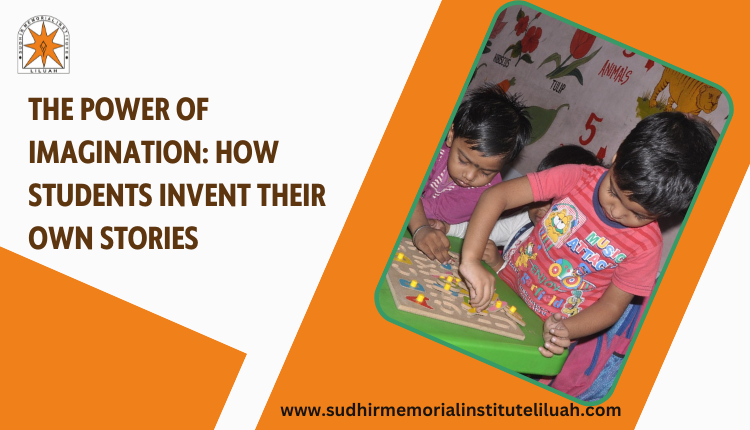Imagination is an essential aspect of childhood whether they turn a box into a fort or an old jacket into a superhero cape, kids use their imagination to transform the world around them. Adults should encourage them by giving them the opportunities as their imagination helps in many aspects of development from social skills to motor functions. Let's know more about what is imaginative play.
Imaginative play refers to kids playing without set rules or structure. It is also known as dramatic play, playing pretend, or make-believe. This method of play allows kids to practice their social skills by mirroring the way others interact, leading to a better understanding of social norms. Playing pretend is a vital part of child development because it helps kids build critical decision-making, cognitive, and social skills.
Imaginative play consists of playing pretend. These activities could include things like:
- Pretending to be another person, creature, or object
- Imagining an item or location is something else
- Creating storylines and acting them out
For instance, kids could pretend their dolls are going shopping, race toy cars around a track or make a pretend meal. All of these activities involve thinking creatively and adapting to the world around them.
Kids can also engage in imaginative play without specific props or even toys. Sometimes, the most fun can come with free or repurposed items. Kids could enjoy turning a sheet and chairs into a blanket fort. On the other hand, they might create a house, pirate ship, or rocket from a giant cardboard box.
Because imaginative play is open-ended and unstructured, this type of play is only limited by imagination. Kids have complete control over who they are and what happens. They can become whoever they want — a five-star chef, astronaut, doctor, ballerina, animal, mythical creature, or anything in between. Kids could become superheroes saving the world and flying across the sky. They could reenact everyday situations and mimic parents, teachers, and other adults in their lives.
No matter how kids use imaginative play, it helps them express themselves and facilitates healthy development. In this regard, CBSE-affiliated schools in Howrah help kids a lot.
Tips to encourage imaginative play
Whether you are an educator, a parent, or another important adult in children's lives, there are many ways to encourage imaginative play. Using tips like these could get started with imaginative play.
- Scheduling play dates
- Providing props
- Reading books and watching movies to spark ideas
- Showing how clothes or objects around the house could create characters or stories
- Participating in imaginative play if asked
- Encouraging this play type with positive words
Imaginative play ideas
Here are some imaginative play ideas you can use to foster your creativity and problem-solving in kids of all ages.
- Create scenarios
- Playing with blocks
- Hold an indoor Olympics
- Transform a cardboard box
- Start a reading routine
- Encourage art projects
- Ask questions
- Support creativity with toys
Create scenarios
The teachers of CBSE school in Howrah district help kids get started by suggesting play scenarios. Whether they want to pretend as astronauts, grocery store shoppers, or restaurant waiters giving them an excellent idea could get their imaginations going.
Play with blocks
Kids of all ages can benefit from playing with building blocks. Whether a kid is a toddler or an elementary schooler, blocks encourage creativity, logical thinking, and motor skills. Kids will flex their creative muscles by crafting blueprints for complicated designs or building an impromptu structure.
Hold an indoor Olympics
Rainy days are a great opportunity to encourage imagination including some physical activity during imaginative play by holding an indoor Olympics. You can even make cardboard medals to distribute and dress up to host a pretend opening and closing ceremony. This activity is especially fun during the actual Olympics, as kids love to mirror the real world.
Transform a cardboard box
A large cardboard box is one of the best free resources for imaginative play. With some scissors, markers, and tape, your child can transform a box into nearly anything. Kids can pretend their box is in a car, house, rocket ship, or anything else they can imagine.
Start a reading routine
Reading every day helps develop imagination. Kids can build literary skills while getting lost in unforgettable stories.
Encourage art projects
Visit art museums and do art projects at home. Explore all sorts of media, including drawing, painting, sculpture, jewelry, collage, and textiles. Give kids the freedom to explore colors, textures, media, and new ideas.
Ask questions
Asking questions keeps your children thinking creatively. For instance, asking them what they would do in potential scenarios or what they think about a book or a movie helps facilitate creative thoughts.
Support creativity with toys
While following instructions is also an important skill to learn, encouraging kids to deviate from instructions can encourage creative ways to use toys. Allowing kids to mix and match parts from different play sets inspires them to make creations from their imaginations.
Tips to Encourage Kids Imagination
Here are some ways to encourage your kid's imagination
- Let your kids be creative at all times
- Let kids tell stories
- Encourage kids to pretend to play
Let your kids be creative at all times
Kids should learn to write or color neatly or experiment with animals, people, etc. The teachers of CBSE school in Howrah district always try by providing them with art and craft supplies. Things like storybooks, kids' books, coloring books, and magazines can all provide kids with great ideas for their imaginations.
Let kids tell stories
There’s no better way to encourage kids’ imagination than to let them tell stories and then let them illustrate them and read them out loud to you. Kids love making up their own stories, but it’s also fun when they make up a story about their friends or family members and create illustrations for their stories.
Encourage kids to pretend to play
Pretend play is an important part of kids’ development as it’s where kids practice real-life situations before taking on that kind of task themselves. Pretend plays also help kids learn social skills.
Conclusion
It is imperative to encourage imaginative kids for your child’s creativity. Kids need a place to let their ideas flow as freely as possible. To promote a space where your kids can let their imagination run and create beautiful things out of that. For CBSE school admission in Howrah, visit the website and enroll your child’s name.







